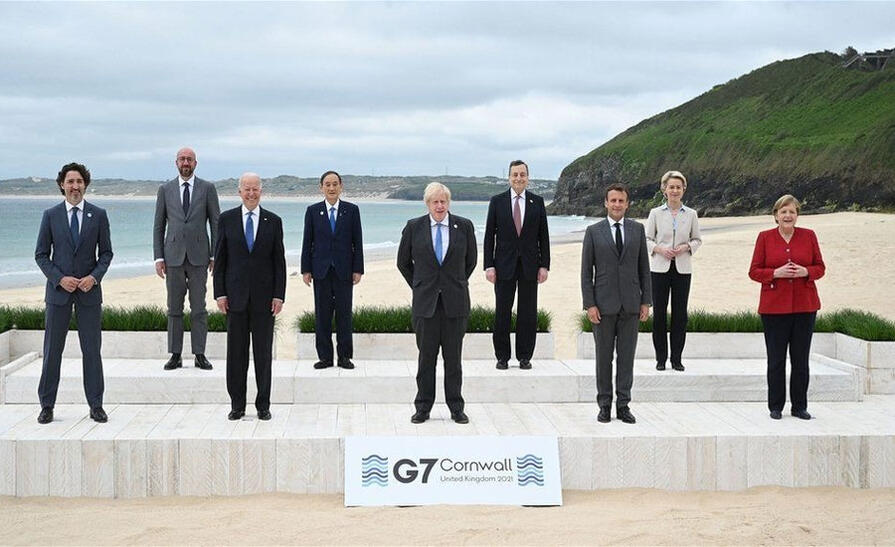Subscribe to our weekly newsletter to get it delivered straight to your inbox!
Leaders attending: (back) Charles Michel (European Council), Mario Draghi (Italy), Suga Yoshihide (Japan) Ursula Gertrud von der Leyen (European Commission)
(front) Justin Trudeau (Canada), Joseph Biden (U.S.), Boris Johnson (U.K.), Emmanuel Macron (France), Andrea Merkel (Germany)
Leaders from the Group of Seven (G7), seven wealthy democracies (Canada, France, Germany, Italy, Japan, the United Kingdom, and the United States), met last weekend for the first time since Joe Biden became President. The summit communiqué emphasized the need for coordinated efforts to battle the pandemic, to restore and expand economic growth, address global infrastructure needs, combat climate change, forge strong partnerships and promote democratic values. The group pledged to cooperate with China where possible, but to also work collectively to oppose unfair economic measures and to call on China to respect human rights in Xinjiang, Hong Kong and elsewhere.
The G7 further pledged to mobilize private capital and to work with low and middle income countries to meet their vast infrastructure needs. The U.S. influence on these plans is evident in the "Build Back Better World" label for the effort, a global version of Biden's 2020 campaign slogan. This call to action is an implicit criticism and challenge to China's Belt and Road Initiative (BRI). The G7 says it will stress transparency, accountability and environmental sustainability and utilize multilateral investment standards such as the G20's Principles for Quality Infrastructure Investment.
Though many in the U.S. have been critical of aspects of the BRI, the U.S. and its allies did not match Beijing's attention to the developing world's need for railroads, highways, ports, and other infrastructure. The G7 says it will now work with partners to provide countries with the expertise and funding they need to advance their economies and meet the needs of their peoples.
Five of the G7 nations joined the China-launched Asian Infrastructure Investment Bank, which has partnered with the World Bank and the Asian Development Bank on many projects. Many more projects, however, have been funded by China's policy banks with the work carried out by other Chinese state firms. Among the G7 countries, only Italy formally signed on to the BRI. We recently examined BRI's economic and environmental impact in Southeast and Central Asia.
The charts below illustrate the extensive economic ties the G7 member nations have with China. Collectively, Japan and the European members of the G7 have greater trade with China than they do with the U.S. Trade between the U.S. and Europe may grow, however, if tariffs imposed by the Trump administration are relaxed.





